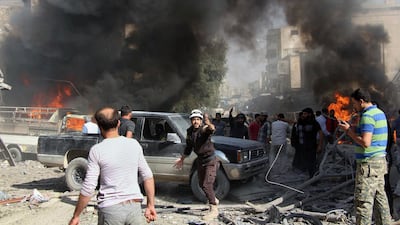For weeks now, the last rebel stronghold in Syria has been anticipating an inevitable assault.
Ever since the Assad regime retook Ghouta and the southern province of Deraa, Idlib in the northwest of the country has been expecting an attack. At the end of July, Bashar Al Assad was explicit: "Idlib is our goal. And not just Idlib. We will be moving into all these regions." The Syrian army has accordingly been taking positions on the borders of the province.
Then, last week, there seemed to be a reprieve. Russia's Syrian envoy, Alexander Lavrentiev, said there were no plans for a major assault on the province and that he hoped the Turkish side could "manage it".
For the estimated two million who live in Idlib, however, those words will provide scant reassurance. A day after the Russian envoy's statement, a Syrian official said the province would be returned to government control by force. The threat of force still hangs over the province, whether it is the spectre of widespread violence on the ground or air assaults by Russian and Syrian air forces. One way or another, the assault on Idlib is coming.
For now, Turkey is seeking to stave off an air assault. For the first time in many months, Turkey is on the back foot in Syria. Previously the country was able to impose its policy priorities over Syrian territory. But now Ankara finds itself in an unusually weak position.
Faced with the possibility of a prolonged assault on Idlib and potentially hundreds of thousands of Syrian refugees streaming across the border into its territory, Turkey is preparing to do Damascus’s dirty work.
At a meeting in the Russian city of Sochi last week, Ankara appeared to have agreed to keep the peace throughout the province, where it maintains a substantial presence and where it has close links with the Free Syrian Army (FSA). Keeping the peace means keeping apart regime forces, rebel groups and the militants of Hayat Tahrir Al Sham (HTS), a former Al Qaeda affiliate, while also trying to eliminate remnants of ISIS. If it can do that, it might be able to stave off the possibility of a Russian and Syrian air assault.
Yet that is no easy task. The retaking of Deraa sparked a war in Idlib between the FSA rebels, HTS and ISIS. Over the past few weeks, as it became clear the regime would turn its attention to Idlib, the groups have been attacking each other and conducting graphic assassinations, clearing the field for whatever comes next. Turkey is now the middle of it, aware that if it cannot keep the peace, it will allow the regime a pretext to attack and retake the province.
This is a deadly position for Ankara but it has been forced into it because – paradoxically – maintaining its control over Idlib province is the only way to remove itself from the Syrian war.
If Turkey can maintain its influence in the province and institute some form of de facto borders, that could create the conditions for Syrian refugees inside Turkey to return to Syrian territory but still under Turkish protection. Faced with increasing tensions at home, Turkey would prefer the refugees to return. That's why Ankara is now pushing for a major security conference which would bring together all the anti-regime groups in Idlib under a Turkish-led military force. There is even talk of a civilian administration inside the province to keep basic services running.
And yet it is precisely this road map to resolving the crisis that makes it all but inevitable that Idlib will be attacked.
Idlib province stretches from the outskirts of Aleppo to the mountains of Latakia. The main Damascus to Aleppo highway passes for 100km through it. Re-opening that road was one of the major, tangible achievements of the Russia-led Astana process. To allow Idlib to remain outside the control of the regime would be to allow a Turkish hand – or, worse, that of a rebel or militant group – at the throat of the country's most vital highway.
The same applies to Russia's military base of Khmeimim, nearby in Latakia province. Already, the Russians have complained of drone attacks on the base from Idlib. To allow Turkey so close to Khmeimim or to the Alawites in Latakia, the Assad regime's heartland, would be politically reckless. Both Mr Al Assad and Vladimir Putin know how quickly alliances can turn into a complicated battleground and neither is likely to countenance the risk.
An assault on Idlib, then, is almost inevitable, whether it comes in the next few weeks or much later, and whether Turkey succeeds or not in rooting out ISIS.
Russia will always maintain the option of retaking the province. For the regime, it is essential. Mr Al Assad will seek to take it back, whether he does so in one assault or by gradually picking off parts of the province, shrinking the space in which the Turks can operate. That, in fact, was the reasoning behind the chemical attack on Khan Sheikhoun last year, which sits at the very southern tip of the province.
For many years, Idlib was used as a safe haven for rebel forces from the rest of Syria. Now it is firmly in the crosshairs of the regime, a crucial province that will stop Turkey from redrawing the map of Syria. Whether it is picked off piece by piece or bombed from the skies, the regime is committed to taking it back from Turkish control.


